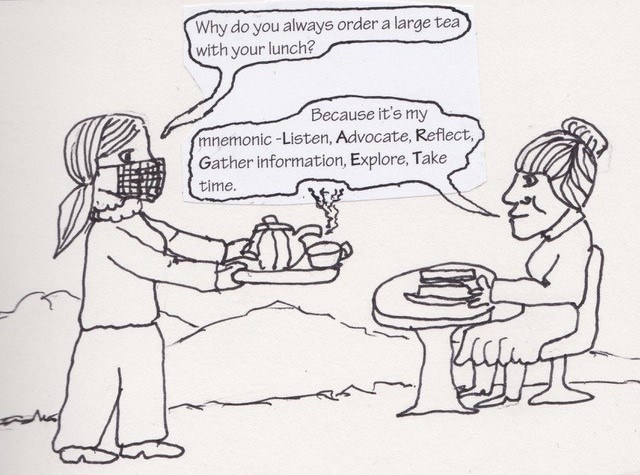Social Work in Context
By Katelen Fortunati, DSW LCSW
Social work is one of the oldest professions, dating back to pre-industrial societies (see The New Circle Spring 2020 issue for a more in depth explanation of social work’s history). Throughout our history, we have always proclaimed social work to be a “values-based profession”; we have our own guiding code of ethics built on a refined set of values that give meaning and purpose to what social work is. Throughout history, our profession has been guided through the various historical contexts by that code, adhering to our values and ethics unlike any other profession. In our practice, we strive to help build social change, empowerment, and human liberation upon a foundation of the principles of human rights and social justice.1 Social work inherently works with both individuals and society, and evolves as our society and its individuals do. At times, that evolution conflicts with both society and individuals, but at our best, social workers are always working to negotiate and find the common ground between the powerful and the excluded.


Social workers are most often in the trenches, working with diverse problems, situations, and people. We must adapt to suit each context we encounter and our practice must also differ according to the context in which we find ourselves. Indeed, social work is a function of and response to the many different contexts in which it operates.2 Just as our work is contextual, so too are the problems we encounter, embedded within a larger context that sometimes gives rise or contributes to the problem. Understanding context not only helps us understand the problem, but also helps us consider solutions and a path forward.
Social work is a profession that operates with a range of players in complex situations, whose interests, perceptions, culture, and social functions are different. This means that social work in urban locations, such as Seattle, Chicago, Atlanta, New York, and Los Angeles, is different from social work in more rural locales, such as Craig, Alaska; Potlach, Idaho; Marissa, Illinois; Bogalusa, Louisiana; and Brattleboro, Vermont. And even within those locations, social work differs. The variances of what social work looks like arise from several differences, such as the resources available, local and state policies, regional culture, religious influences, political landscapes, and economic accessibility.

We social workers are ourselves complex, as we are professionals, employees, citizens, and community members, each of these with their own backgrounds, values, beliefs, agendas, stressors, and motivations. These elements when combined affect our interactions with clients and influence the assumptions and judgments we may make with respect to a client.3 Social workers are also impacted by our organizational context. We are employees in public and private organizations, which have policies, guidelines, visions, missions, priorities, objectives, and mandates to which we are supposed to conform.

One of the struggles within our profession has been providing evidence of clear pathways to and positive outcomes of our work. Our profession has long been questioned and challenged for legitimacy due to the difficulty providing such evidence. However, as social workers, we know it is not as simple as taking an intervention off the shelf and applying it to an individual or situation. This difficulty directly points to the biggest hurdle in applying evidence-based practice: the distinctive and innumerable variations of humans in context. The families with whom we work are often disadvantaged, may lack social capital, and are experiencing fractious relationships—all of which are being compounded by environmental factors such as poor housing, social isolation, deprivation of or little access to social support, education, or training. We, as social workers, must try and make sense of the context for each family and individual with whom we work, while operating within the limitations of the rules and policies of the agencies for which we work. Making assessments and judgments about family situations means navigating difficult and often unknown terrain and understanding events and circumstances that are constantly changing. There are few, if any, neat and tidy outcomes, where a result exactly follows an evidence-based intervention in the way predicted.4 As social workers, attentions should instead be given to the way that we form judgments and make decisions that benefit and protect our clients as we have grown to understand their context and how we can best adapt to help them within that context.

So, what can we do as social workers to improve our understanding of the contexts in which our clients live and the changes we can effect?
Listen Take yourself out of the situation. Listen to your clients and the community in which you are working; let go of your reaction, and listen to what your clients’ motivations are and what outcomes they want.
Gather Information Learn not only about the personal history of your clients but also the history of their families, their neighborhood, community, and region, and how that history has a trickle-down effect on the ways in which your clients are functioning and why gaps persist in meeting their needs.
Be Reflective Think about what you are seeing, hearing, and experiencing. Then process your reflections with a conscious acknowledgement and examination of any assumptions or preconceptions you are bringing to the moment.
Explore Go into the community in which you are working and talk to the stakeholders and neighbors to learn about community strengths that will help you deconstruct and re-examine any preconceived perceptions you may hold.
Advocate No only within the family unit, but also in the community at large. Use your voice to speak up and speak out. Be an agent working to deconstruct harmful policies that contribute to social injustice.
Take Time Listen to, read, or watch materials that provide additional insights and perspectives outside your own realm of awareness, experience, or expertise. Podcasts, documentaries, and books (both fiction and nonfiction) are readily available mediums that can help us gain experiential understandings, while affording the time and space to process and grow.

As social workers, we are incredibly adaptable as we have shown in our profession’s growth and sustainability for over 500 years. It continues to be our privilege and responsibility to learn about the intricacies of contexts—for our clients, our society and our organizations, and ourselves. We can then use this knowledge to improve how we understand each of these contexts and influence them positively in the service of client empowerment and growth.
- 1. International Federation of Social Workers. “What is Social Work?” Retrieved from https://www.ifsw.org/what-is-social-work/global-definition-of-social-work/
2. Ife, J. (1997). Realising the Purpose of Social Work for Stakeholders – Maintaining the Vision and Making a Difference in a World of Change. In M. Frederico (Ed.), 25th AASW National Conference 1997: Social Work Influencing Outcomes (Australian National University, ed., Vol. 1, pp. 16-26). Australian Association of Social Workers.
3. Shulman, L. (1991) International Social Work Practice: Towards an Empirical Theory USA, F.E Peacock Publishers, Inc.
4. Dore, I. (2015, September 3). Context, not evidence, is everything in social work. The Guardian.

Katelen Fortunati, DSW LCSW
Katelen received her Master’s in Social Work from Saint Louis University and her Doctorate of Clinical Social Work from Rutgers. She also received a Certificate in Violence Prevention from Washington University of St. Louis. Her work has focused on helping others understand the ambiguous grief experienced by children with incarcerated parents and the impact of parental incarceration on parent-child attachment. Currently, she is working in Colorado disseminating this information through the public school systems and county corrections through her non-profit organization, Every Single Kid. She is also the author of the ChIPs books for children downloadable free from Safer Society Press.

